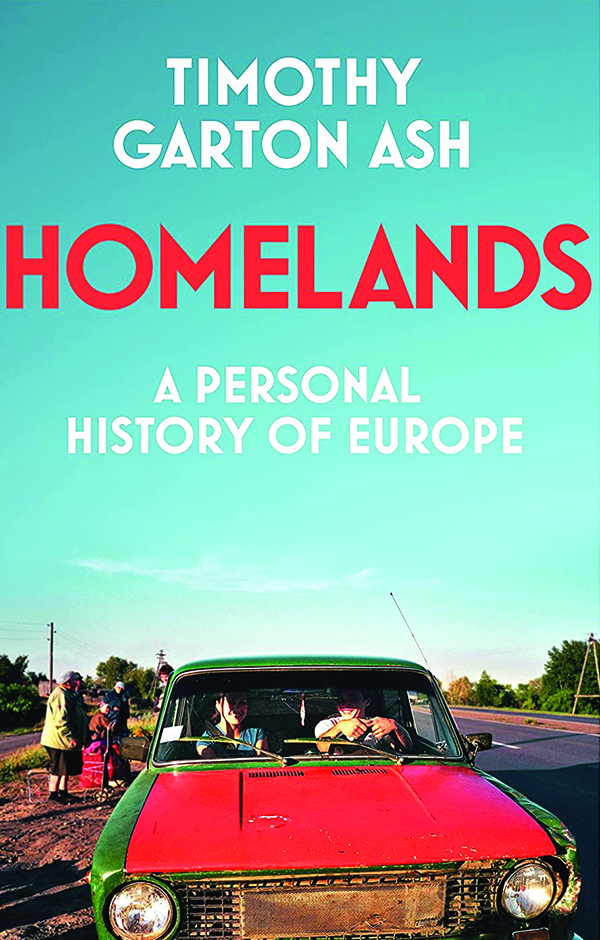
Timothy Garton Ash’s odyssey through history
Gustav Jönsson
George Orwell, Timothy Garton Ash’s hero, used to say that he wouldn’t go to soirees where he might meet someone he had been planning to write about. He feared that his intellectual judgment might be compromised if he found they were really quite agreeable.

Garton Ash seems to have no such worries. Ash, a columnist, historian, and writer who has penned several “histories of the present,” has had a preternatural way of meeting the right person at the right time. In his new Homelands: A Personal History of Europe, he recalls a visit in early 1994 to St. Petersburg, where he met “a short, thick-set man with an unpleasant, vaguely rat-like face,” who seemed to be “some kind of side-kick to the city’s mayor.” Vladimir Putin, whose puffed-up cheeks now to my eyes more resemble a chipmunk’s, then launched into a minatory speech on why the Russian Federation must reassert itself in “territories that historically always belonged to Russia.” He even instanced Crimea. The world, he continued, must be made to recognize the “Russian people as a great nation,” which meant conceding the legitimacy of Russia’s say over Russians living outside its borders. “Putin’s post-imperial yearnings were already clear when I met him in 1994,” Garton Ash writes, “well before the first eastward enlargement of NATO in 1999.”
That should puncture the tired claim that NATO enlargement caused the Russian president’s invasion of Ukraine. When George Kennan claimed that with the removal of the communist regime, Europe faced no threats, he ignored the risk of the Russian Empire rising from the ruins of the Soviet Union. Kennan may not have listened to Putin, but Garton Ash certainly had. Even though he hoped Russia might liberalize, he prevailed on George W. Bush to grant NATO membership to all qualifying central and Eastern European countries. “Including the Baltic States?” Bush asked. “Yes, definitely.”
A few months after he met Bush, Ash was back in Washington, this time to meet with Dick Cheney. One moment he is chatting with Madeleine Albright, and the next, he is writing Tony Blair’s speeches. Thatcher famously summoned him to Chequers to counsel her on German unification — he was firmly in favor of it.
The Marxist historian Perry Anderson once wrote that Garton Ash tended to become reverent toward statesmen he had lunched with, ridiculing especially his effusive praise of John Paul II. But that’s not really fair to Garton Ash. He vitiates Cheney’s ruthless hubris in a terrific paragraph. And he recalls how it seemed that Thatcher’s chief objection to a united Germany was that she had once been “handbagged” by Helmut Kohl. Courtier, maybe, but by no means uncritical.
“Europeans can have multiple homelands,” Garton Ash writes, “but no one is equally at home in all parts of Europe.” His own sympathies lie with the central European countries. Throughout the 1980s, he traveled the region, slipping intrepidly from one clandestine meeting to the next while befriending an impressive set of dissidents: Michnik, Kuron, Mazowiecki, and Geremek in Warsaw; Goncz in Budapest; Havel in Prague.
In the DDR, he was tailed by the Stasi — the subject of perhaps his most moving book, The File — before they booted him out. He has already covered this period in The Magic Lantern, but the reprise is worth it. He recalls sneaking through a forest to reach Havel’s home, knocking furtively on a window to be let in. And he brings his reflections on ‘89 up to the present: One morning, he gets a letter from Viktor Orban, yet another old acquaintance, in reply to his criticism of the Hungarian government. He bridles, rightly, when Orban publishes that missive with the title “Samizdat.”
Garton Ash calls Homelands “history illustrated by memoir.” It is written with the “full use of the benefit of hindsight,” relying on “the best primary sources and the most recent secondary literature.” He makes no claims to comprehensiveness or impartiality. But even with those caveats, he sets himself a large task: “I offer both a personal account and an interpretation of Europe’s history in these overlapping timeframes of post-war and post-Wall.” To offer both personal reminiscences and a rigorous, if partial, historical investigation of such vast scope, in no more than 350 pages, requires that much terrain be breezed by.
The same weaknesses that beset earlier Ash books in the same vein can thus be found in Homelands. It gives scant interpretation of European history, consisting instead of a series of vignettes. His chapter on war crimes in the former Yugoslavia is excellent, but it is no more than a sketch. He recalls a chilling conversation he had in the hills outside Pristina with Ramush Haradinaj of the Kosovo Liberation Army, wherein Haradinaj gleefully rejoiced in the murder of two police officers. (“I hope it was more than two.”) And he has harsh words for the European leaders who looked elsewhere when the mass graves filled up with innocent victims and found it convenient to forget Croatia’s “cleansing” of Krajina. Vivid though that chapter is, it has little historical inquiry into the causes of Yugoslavia’s breakup; instead, he cites some lines of W.H. Auden:
I and the public know
What all schoolchildren learn,
Those to whom evil is done
Do evil in return.
Instead of repeating that half-true banality, Garton Ash should’ve turned to the first part of that stanza, where Auden exhorts historians to “unearth the whole offence.” That’s the historian’s task: to go beyond platitudes. The rest of us, Auden says, must resort to commonplaces, but scholars can do better. Thus, it isn’t enough to briefly note that “it required a lot of bad politics, propaganda, incitement and lies to lead people down the road to violence.” To say that is to state the obvious. Even though Garton Ash makes some gestures toward a structural analysis of Europe’s history, he offers little in that regard. One of his leitmotifs is that Europe has been shaped by what he calls the “memory engine.” It sounds like something out of Borges, but it’s really nothing more than the trivial notion that our memories shape us and our societies.
But such criticisms can be overlooked if Homelands is read as a letter to a young European in the genre of Rainer Maria Rilke’s Letters to a Young Poet. It is evidently written for someone who has heard of Mussolini but is foggy on Franco. “Just pause for a moment,” Garton Ash writes, “and imagine Italy being ruled by an aged Mussolini until 1975.”
If it is a letter, it is a letter of love to Europe. And, like most love letters, it continuously treads the line between the poignant and the merely soppy. Though there’s more of the former than the latter. Garton Ash could have spared us the pages giving a tearful precis of the opening ceremony of the London Olympics. But he writes touchingly on his visit to a refugee center in Ceuta, the Spanish enclave on the northern coast of Africa, where he sees the human cost of Europe’s new “Iron Curtain.” Read as a letter, such gemlike vignettes can be treasured. Because in them, Garton Ash has captured something of what it means to be European. Though he is proudly in love with Europe, he is not blind to its faults.
Gustav Jönsson is a Swedish freelance writer based in the United Kingdom.
